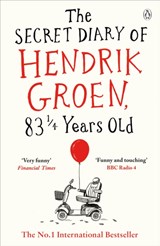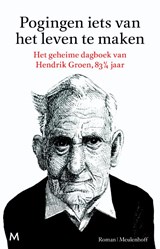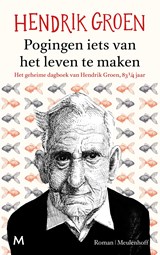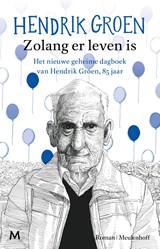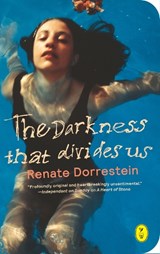Hester Velmans on translating the first sentence of Hendrik Groens Pogingen iets van het leven te maken
14 september 2016Onlangs verscheen de The Secret Diary of Hendrik Groen, 83 ¼ Years Old, de Engelse vertaling van Hendrik Groens Pogingen iets van het leven te maken. Wij vroegen de vertaalster, Hester Velmans, haar werk toe te lichten.
N.B. We publiceerden voor uit Pogingen iets van het leven te maken en Groens tweede boek Zolang er leven is. Lees de fragmenten op Athenaeum.nl.
Ik hou ook het komende jaar niet van bejaarden.
Another year, and I still don’t like old people.
You just have to love this ‘anonymous’ writer, Henrik Groen, right off the bat. It’s all here, in nine perfect, concise words — tone (the crotchety-old-man’s voice), subject matter (old people) and structure (the book is organized as a year-long diary). Reading those words for the first time, I immediately formed a picture in my mind of the character: Hendrik has a twinkle in his eye, wants to come off as a bit of a cynic, but can’t help hoping, deep down, that you’ll like him. The question was: would I be able to convey his wry, blunt, understated humour, which is so typically Dutch? More challenging still: how does a thoroughly Americanized expat like me, find the right British slang for an 83-year-old pensioner living in an Amsterdam care home, since this translation is first coming out in the U.K.?
This is where one has to become an actor, to step into character, in a dialect that may not even be one’s own. But I have faced greater hurdles than this. I have had to find a quirky, flowery, yet occasionally foul-mouthed voice for a young girl growing up during China’s cultural revolution (Lulu Wang’s The Lily Theatre);another time, I had to turn a French interpretation of 14th-century Old Norse (Bernard du Boucheron’s The Voyage of the Short Serpent) into some semblance of archaic yet understandable English. It’s when there are layers of challenges such as those that translating is the most fun.
But back to The Secret Diary of Hendrik Groen, 83 3/4 years old. It wasn’t until I had struggled with the next paragraph for a while that I decided this was something I wouldn’t mind tackling.
‘Er was royaal poedersuiker gemorst. Om de tafel beter af te kunnen nemen met een vaatdoekje zette mevrouw Smit de schaal met appelflappen even op een stoel. Mevrouw Voorthuizen kwam aanlopen en ging met haar enorme reet midden in de schaal met flappen zitten zonder het zelfs maar te merken.’
My first attempts didn’t sound like Hendrik at all; they had none of his effortless cheekiness. (‘Great quantities of icing sugar have been spilled. […] Mrs Voorthuizen walked up and sat her enormous bum down right on top of the dish with the apple turnovers, without even noticing.’) I had to put it through several variations until it had the breezy tone I was after:
‘Great clouds of powdered sugar were spilled a moment ago. Mrs Smit had put the plate of apple tartlets down on a chair because she wanted to wipe down the table with a cloth. Along comes Mrs Voorthuizen, who inadvertently parks her enormous bottom right on top of the pastries.’
This is not a literal translation. There are no ‘great clouds’ of icing sugar in the original; the Dutch expression ‘royaal gemorst’ means ‘liberally spilled’. The last sentence switches to the present tense; that is not in the original either, but I felt it was the way Hendrik would have told the story to a listener. Try as I might, I could not find an equivalent self-rhyming word for ‘appelflappen’, which has a humorous ring to it, and so was sorry to have to make do with the more prosaic ‘apple tartlets’. You may also have noticed that the word ‘reet’ has been cleaned up and is politely rendered as ‘bottom’. This was a change requested by the editors; if it were up to me, it would have been a shade naughtier, like ‘bum’. But in translating you have to take into account not only the differences in register and tone of the two languages, but also their conventions. Each language has certain profanities that are used so frequently that they have lost their power to shock. Once translated into another tongue, however, they may be more offensive than originally intended. In Dutch, ‘reet’ does sound a bit risqué, but in English the c-word or ‘arse’ seem ruder and perhaps out of character for the meek old gentleman who is introducing himself to us here.
The best piece of translation advice I ever heard was from Jorge Luis Borges, who told his translator to ‘write what I meant, not what I said.’ My main aim in translating Hendrik Groen’s diary was not to give his exact words, but to imitate his endearing, resigned, yet often feisty voice.
Hester Velmans vertaling van Een hart van steen van Renate Dorrestein werd bekroond met de Vondelprijs in 2001. In 2014 kreeg zij een NEA (U.S. National Endowment of the Arts) Translation Fellowship. Recent verscheen haar vertaling van Daglicht van Marion Pauw, en Joost Zwagermans 'Winnie en de onschuld' in The Penguin Book of Short Stories (2016). Nog niet verschenen zijn haar vertalingen van Anno domini 2065 van Dioscorides en De consequenties van Niña Weijers. Ga voor meer informatie over Hester Velmans naar Hestervelmans.com.



